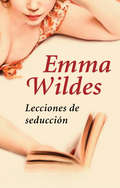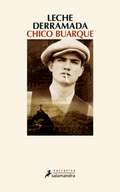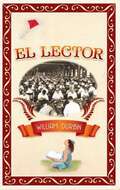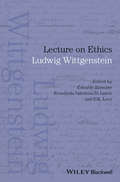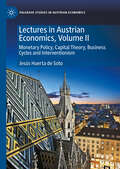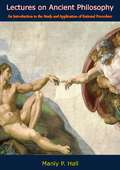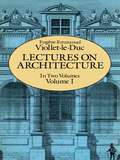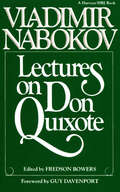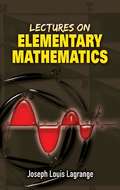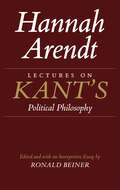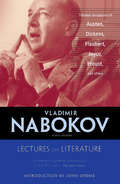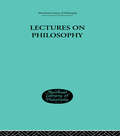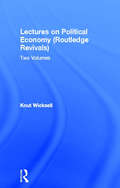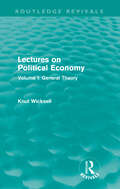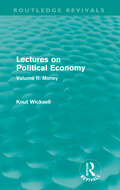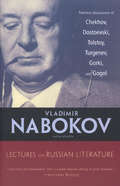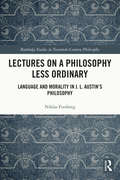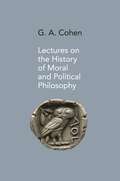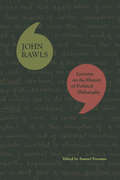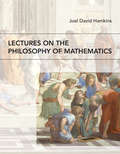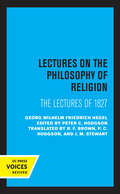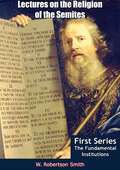- Table View
- List View
Lecciones de seducción
by Emma WildesUna dama jamás debería tener como modelo a una libertina... ¿o tal vez sí? Brianna había descubierto aquel escandaloso librito, Los consejos de lady Rothburg, en las estanterías polvorientas de una vieja librería. En cuanto lo abrió supo que no debía comprarlo, pero la tentación fue irresistible. Casada con Colton Northfield, un aristócrata apuesto, poderoso y atento, ansiaba enamorar al hombre que se ocultaba tras aquella fachada de cortesía y distancia, aunque para ello tuviera que armarse de valor y seguir paso a paso las sabias sugerencias -mezcla de picardía y sentido común, de audacia y sabiduría popular, de descaro y sutileza- de lady R., la famosa cortesana. Reseña:«Emma Wildes es una autora recién llegada, pero ya la tengo en mi lista. Su segunda novela, Lecciones de seducción, es tan buena como la primera, Una apuesta indecente. Presenta una historia con imaginación y bien escrita, con unas fabulosas escenas de amor y unos personajes que interesan. Emma Wildes es una joya escondida.»All About Romance
Leche derramada
by Chico BuarqueUna novela de una exquisita voluptuosidad, tierna, conmovedora, trágica. Postrado en cama por el peso de la edad, Eulálio Montenegro d#Assumpção va desgranando los recuerdos atesorados en su memoria. Su frágil cuerpo es testimonio de una existencia centenaria cuyos detalles rememora frente a su octogenaria hija, Eulália, o a quien se preste a escucharlo. Los acontecimientos de su vida y la de sus antepasados se suceden sin orden cronológico, entreverados de digresiones, insidias y mentiras piadosas, tejiendo un tapiz fascinante que condensa más de dos siglos de historia de una familia brasileña. Heredero de una poderosa estirpe de próceres -su tatarabuelo llegó de Portugal con la corte del rey Pedro IV-, Eulálio ha visto desvanecerse una inmensa fortuna y el buen nombre de la familia. Con loca y juvenil pasión amó a su esposa, la sensual Matilde, cuya pérdida ha llorado durante ochenta años. Y ahora, desde su aristocrática perspectiva de la realidad, emerge con voz cautivadora una compleja saga familiar, a la vez liviana y exuberante, vívido reflejo de un Brasil desconocido y alejado de los tópicos que se ha dado a sí mismo para construirse una imagen ante el mundo. Personaje orgulloso y altivo, pero profundamente sincero y con una redentora capacidad para reírse de sí mismo, Eulálio despliega un agudo sentido del humor que, unido a su particular interpretación de las cosas, hace de Leche derramada la novela que ha consagrado a Buarque como uno de los escritores más leídos y unánimemente valorados en el panorama de las letras portuguesas contemporáneas. La crítica ha dicho...«Leche derramada es la obra más sagaz e inspirada de Chico Buarque. [...] Una de las novelas más importantes publicadas en este país en la primera década del siglo XXI.»O Globo «Con esta novela Chico Buarque se revela como uno de los grandes escritores de Brasil.»Semanário Económico «Es Brasil en forma de novela [...] Leche derramada tendrá una larga vida.»Jornal do Brasil «Leche derramada es un libro divertido, que se lee de un tirón [...] Sin nostalgia ni disimulado apego a los tiempos que relata, la invención realista de Chico Buarque es un maravilloso soplo de aire fresco.»Folha de S. Paulo «Si con Budapest Chico Buarque parecía haber alcanzado la cumbre de sus capacidades literarias, con Leche derramada se alza todavía más alto y firma una de las mejores novelas en lengua portuguesa de la primera década del siglo XXI.»Expresso «Leche derramada es un libro importante, en el que Chico Buarque supera su anterior novela, Budapest, y alcanza en la ficción la misma potencia vernácula e imaginativa de sus mejores canciones.»O Estado de S. Paulo
Lector
by William DurbinThirteen-year-old Bella wants to be a lector just like her grandfather, who sits on a special platform in the cigar factory, reading great novels, the newspaper, and union news to workers as they roll the cigars. Being a lector is an important role in their immigrant community. But the hard times of the Depression mean that Bella must go to work in the factory; her hope of getting the education a lector needs seems impossible. Meanwhile, the factory workers and owners clash. People lose jobs, innocent workers are arrested, and the Ku Klux Klan prowls the area. And then there are those amazing new radios showing up all over town. Could the radio take the place of the lector? Bella must decide her own future and help her people preserve their history. Bella's lively, warmhearted story captures the color and flavor of Ybor City as it explores an intriguing part of our American history.
Lecture on Ethics
by Ludwig WittgensteinThe most complete edition yet published of Wittgenstein’s 1929 lecture includes a never-before published first draft and makes fresh claims for its significance in Wittgenstein’s oeuvre. The first available print publication of all known drafts of Wittgenstein’s Lecture on Ethics Includes a previously unrecognized first draft of the lecture and new transcriptions of all drafts Transcriptions preserve the philosopher’s emendations thus showing the development of the ideas in the lecture Proposes a different draft as the version read by Wittgenstein in his 1929 lecture Includes introductory essays on the origins of the material and on its meaning, content, and importance
Lectures in Austrian Economics, Volume II: Monetary Policy, Capital Theory, Business Cycles and Interventionism (Palgrave Studies in Austrian Economics)
by Jesús Huerta de SotoThis book, the second of two volumes, provides a comprehensive overview of the core topics within Austrian economics. With a focus on macroeconomics, it explores foundational ideas within Austrian economics, including monetary and banking theory, law, capital theory, business cycles, the relationship between the market and the state, and interventionism. These ideas are contextualized within the history of economic thought, in particular the work of Ludwig von Mises. The Keynesian system, reform to the banking system, wages, social order, fiscal policy, and the political economy of ethics are also discussed. This book offers an accessible and engaging synthesis of Austrian economics that redefines the topic within modern economics. It will be relevant to students and researchers interested in Austrian economics and the political economy.
Lectures on Ancient Philosophy: An Introduction to the Study and Application of Rational Procedure
by Manly P. HallA classic companion and expansion upon Manly P. Hall’s magnum opus, The Secret Teaching Of All Ages. In this volume Hall delves into the deepest themes of the philosophical, metaphysical, and cosmological issues that he mastered during his lifetime.
Lectures on Architecture: Volume 1
by Eugene-Emmanuel Viollet-le-DucVolume 1 of an unabridged reprint of extremely influential work by great 19th-century architect, champion of the Gothic Revival. Coverage of Greek and Roman architecture, Byzantine architecture, teaching of architecture, monumental sculpture, domestic architecture, much more. Over 230 engravings and woodcuts (most by Viollet-le-Duc) enhance the text. Republication of rare English edition (1877--1881).
Lectures on Don Quixote
by Vladimir NabokovOne of the twentieth century&’s greatest novelists offers his take on the Spanish classic. The author of Lolita and Pale Fire was not only a master of fiction but a distinguished literary critic as well. In this collection of lectures, which he delivered at Harvard in the early 1950s, Vladimir Nabokov shares insights based on a chapter-by-chapter synopsis of the seventeenth-century novel by Miguel de Cervantes, a timeless classic and one of the most deeply influential works in all of Western literature. Rejecting the common interpretation of Don Quixote as a warm satire, Nabokov perceives the work as a catalog of cruelty through which the gaunt knight passes. Edited and with a preface by Fredson Bowers, this volume offers &“a powerful, critical, and dramatic elaboration of the theme of illusion&” (V. S. Pritchett, The New York Review of Books).
Lectures on Elementary Mathematics (Dover Books on Mathematics)
by Joseph Louis LagrangeOne of the eighteenth century's greatest mathematicians, Lagrange made significant contributions to all fields of analysis and number theory. He survived the French Revolution to deliver these lectures in 1795 at the École Normale, a training school for teachers. An exemplar among elementary expositions, Lagrange's talks feature both originality of thought and elegance of expression.The five lectures begin with discussions of arithmetic that focus on fractions and logarithms as well as theory and applications. Subsequent talks consider algebra, with emphasis on the resolution of equations of the third and fourth degree, the resolution of numerical equations, and the employment of curves in the solution of problems. Students, teachers, and others with an interest in mathematics will find this volume a unique reading book in mathematics, with fascinating historical and philosophical remarks by a distinguished mathematician.
Lectures on Kant's Political Philosophy
by Hannah Arendt edited by Ronald BeinerHannah Arendt's last philosophical work was an intended three-part project entitled The Life of the Mind. Unfortunately, Arendt lived to complete only the first two parts, Thinking and Willing. Of the third, Judging, only the title page, with epigraphs from Cato and Goethe, was found after her death. As the titles suggest, Arendt conceived of her work as roughly parallel to the three Critiques of Immanuel Kant. In fact, while she began work on The Life of the Mind, Arendt lectured on "Kant's Political Philosophy," using the Critique of Judgment as her main text. The present volume brings Arendt's notes for these lectures together with other of her texts on the topic of judging and provides important clues to the likely direction of Arendt's thinking in this area.
Lectures on Literature (Vib Ser. #Vol. 227)
by Vladimir NabokovThe acclaimed author of Lolita offers unique insight into works by James Joyce, Franz Kafka, Jane Austen, and others—with an introduction by John Updike. In the 1940s, when Vladimir Nabokov first embarked on his academic career in the United States, he brought with him hundreds of original lectures on the authors he most admired. For two decades those lectures served as the basis for Nabokov&’s teaching, first at Wellesley and then at Cornell, as he introduced undergraduates to the delights of great fiction. This volume collects Nabokov&’s famous lectures on Western European literature, with analysis and commentary on Charles Dickens&’s Bleak House, Gustav Flaubert&’s Madam Bovary, Marcel Proust&’s The Walk by Swann&’s Place, Robert Louis Stevenson&’s &“The Strange Case of Dr. Jekyll and Mr. Hyde,&” and other works. This volume also includes photographic reproductions of Nabokov&’s original notes, revealing his own edits, underlined passages, and more. Edited and with a Foreword by Fredson BowersIntroduction by John Updike
Lectures on Philosophy
by George Edward MooreThis is Volume XV in a collection of twenty-two on 20th Century Philosophy. First published in 1966, as a part of the Muirhead library of Philosophy this work consists of selections from three courses of lectures. The first course was given in the academic year 1925-26, the second in 1928-29, and the third in 1933-34. The first two (entitled “ Metaphysics” ) were intended primarily for Part II of the Moral Sciences Tripos; the last (entitled “ Elements of Philosophy” ) for Part I. (The selections from the second course, which are the most extensive, are printed first.)
Lectures on Political Economy: Two Volumes (Routledge Revivals: Lectures on Political Economy)
by Knut WicksellKnown as the "economist's economist" for his work on creating a synthetic economic theory, Swedish economist Knut Wicksell was a controversial, but highly influential figure in modern economic thought. His contributions to marginal productivity theory, income distribution and, most notably, his theory of interest would come to have a profound impact upon twentieth century economic theory, not least in the work of John Maynard Keynes. First published in English in 1934 and 1935, this Routledge Revival set is a reissue of Wicksell's two volume work on political economy, first published in Sweden in 1901 and 1906. This work is aimed at both the professional economist and the advanced student alike, as well as all those interested in the theoretical development of political economy. Volume I concerns itself predominantly with issues of theory: specifically the theory of value, the theory of production and distribution and the theory of capital accumulation. Volume II deals with theories relating to money, currency and credit.
Lectures on Political Economy: Volume I: General Theory (Routledge Revivals: Lectures on Political Economy)
by Knut WicksellFirst published in English in 1934, this Routledge Revival is a reissue of Volume I of Swedish economist Knut Wicksell's hugely influential work two volume work on political economy, a text which influenced a generation of economists. Concerned predominiantly with a mathematical treatment of issues of economic theory, the first volume deals specifically the theory of value, the theory of production and distribution and the theory of capital accumulation. Wicksell examines the origin of interest and offers a solution to the problem of distribution under capitalistic production, referencing the work of Eugen vom Böhm-Bawerk and Karl Gustav Cassel.
Lectures on Political Economy: Volume II: Money (Routledge Revivals: Lectures on Political Economy)
by Knut WicksellFirst published in English in 1935, this Routledge Revival is a reissue of Volume II of Knut Wicksell's Lectures on Political Economy. This volume deals with his contribution to macroeconomics, through an explication of economic theory and principle relating specifically to money, both in terms of functions and value, with a particular emphasis upon currency and credit. This volume also includes Wicksell's work on the quantity theory of money in which he first made the important distinction between the real rate of return on new capital (which he called the "natural rate of interest") and the actual market rate of interest.
Lectures on Religion
by Stephen J. Fleming John W. WelchLectures discussing the role religion played in the founding of America and its continued role up until the early 20th century
Lectures on Russian Literature
by Vladimir NabokovThe acclaimed author presents his unique insights into the works of great Russian authors including Tolstoy, Dostoevski, Gogol, Gorki, and Chekhov. In the 1940s, when Vladimir Nabokov first embarked on his academic career in the United States, he brought with him hundreds of original lectures on the authors he most admired. For two decades those lectures served as the basis for Nabokov&’s teaching, first at Wellesley and then at Cornell, as he introduced undergraduates to the delights of great fiction. This volume collects Nabokov&’s famous lectures on 19th century Russian literature, with analysis and commentary on Nikolay Gogol&’s Dead Souls and &“The Overcoat&”; Ivan Turgenev&’s Fathers and Sons; Maxim Gorki&’s &“On the Rafts&”; Leo Tolstoy&’s Anna Karenina and The Death of Ivan Ilych; two short stories and a play by Anton Chekhov; and several works by Fyodor Dostoevski, including Crime and Punishment, The Idiot, and The Possessed. This volume also includes Nabokov&’s lectures on the art of translation, the nature of Russian censorship, and other topics. Featured throughout the volume are photographic reproductions of Nabokov&’s original notes. &“This volume . . . never once fails to instruct and stimulate. This is a great Russian talking of great Russians.&” —Anthony Burgess Introduction by Fredson Bowers
Lectures on a Philosophy Less Ordinary: Language and Morality in J.L. Austin’s Philosophy (Routledge Studies in Twentieth-Century Philosophy)
by Niklas ForsbergThis book offers a comprehensive reinterpretation of J.L. Austin’s philosophy. It opens new ways of thinking about ethics and other contemporary issues in the wake of Austin’s philosophical work. Austin is primarily viewed as a philosopher of language whose work focused on the pragmatic aspects of speech. His work on ordinary language philosophy and speech act theory is seen as his main contribution to philosophy. This book challenges this received view to show that Austin used his most well-known theoretical notions as heuristic tools aimed at debunking the fact/value dichotomy. Additionally, it demonstrates that Austin’s continual returns to the ordinary is rooted in a desire to show that our lives in language are complicated and multifaceted. What emerges is an attempt to think with Austin about problems that are central to philosophy today—such as the question about linguistic inheritance, truth, the relationship between a language inherited and morality, and how we are to cope with linguistic elasticity and historicity. Lectures on a Philosophy Less Ordinary will appeal to scholars and advanced students working on Austin’s philosophy, philosophy of language, and the history of analytic philosophy.
Lectures on the History of Moral and Political Philosophy
by Jonathan Wolff G. A. CohenPreviously unpublished writings from one of the most important political philosophers of recent timesG. A. Cohen was one of the leading political philosophers of recent times. He first came to wide attention in 1978 with the prize-winning book Karl Marx's Theory of History: A Defence. In subsequent decades his published writings largely turned away from the history of philosophy, focusing instead on equality, freedom, and justice. However, throughout his career he regularly lectured on a wide range of moral and political philosophers of the past. This volume collects these previously unpublished lectures.Starting with a chapter centered on Plato, but also discussing the pre-Socratics as well as Aristotle, the book moves to social contract theory as discussed by Hobbes, Locke, and Hume, and then continues with chapters on Kant, Hegel, and Nietzsche. The book also contains some previously published but uncollected papers on Marx, Hobbes, and Kant, among other figures. The collection concludes with a memoir of Cohen written by the volume editor, Jonathan Wolff, who was a student of Cohen's.A hallmark of the lectures is Cohen's engagement with the thinkers he discusses. Rather than simply trying to render their thought accessible to the modern reader, he tests whether their arguments and positions are clear, sound, and free from contradiction. Throughout, he homes in on central issues and provides fresh approaches to the philosophers he examines. Ultimately, these lectures teach us not only about some of the great thinkers in the history of moral and political philosophy, but also about one of the great thinkers of our time: Cohen himself.
Lectures on the History of Political Philosophy
by John Rawls Samuel FreemanThis last book by the late John Rawls, derived from written lectures and notes for his long-running course on modern political philosophy, offers readers an account of the liberal political tradition from a scholar viewed by many as the greatest contemporary exponent of the philosophy behind that tradition. <p><p> Rawls's goal in the lectures was, he wrote, "to identify the more central features of liberalism as expressing a political conception of justice when liberalism is viewed from within the tradition of democratic constitutionalism." He does this by looking at several strands that make up the liberal and democratic constitutional traditions, and at the historical figures who best represent these strands--among them the contractarians Hobbes, Locke, and Rousseau; the utilitarians Hume, Sidgwick, and J. S. Mill; and Marx regarded as a critic of liberalism. Rawls's lectures on Bishop Joseph Butler also are included in an appendix. Constantly revised and refined over three decades, Rawls's lectures on these figures reflect his developing and changing views on the history of liberalism and democracy--as well as how he saw his own work in relation to those traditions. <p> With its clear and careful analyses of the doctrine of the social contract, utilitarianism, and socialism--and of their most influential proponents--this volume has a critical place in the traditions it expounds. Marked by Rawls's characteristic patience and curiosity, and scrupulously edited by his student and teaching assistant, Samuel Freeman, these lectures are a fitting final addition to his oeuvre, and to the history of political philosophy as well.
Lectures on the History of Political Philosophy
by John RawlsThis last book by the late John Rawls, derived from written lectures and notes for his long-running course on modern political philosophy, offers readers an account of the liberal political tradition from a scholar viewed by many as the greatest contemporary exponent of the philosophy behind that tradition. Rawls’s goal in the lectures was, he wrote, “to identify the more central features of liberalism as expressing a political conception of justice when liberalism is viewed from within the tradition of democratic constitutionalism.” He does this by looking at several strands that make up the liberal and democratic constitutional traditions, and at the historical figures who best represent these strands—among them the contractarians Hobbes, Locke, and Rousseau; the utilitarians Hume, Sidgwick, and J. S. Mill; and Marx regarded as a critic of liberalism. Rawls’s lectures on Bishop Joseph Butler also are included in an appendix. Constantly revised and refined over three decades, Rawls’s lectures on these figures reflect his developing and changing views on the history of liberalism and democracy—as well as how he saw his own work in relation to those traditions. With its clear and careful analyses of the doctrine of the social contract, utilitarianism, and socialism—and of their most influential proponents—this volume has a critical place in the traditions it expounds. Marked by Rawls’s characteristic patience and curiosity, and scrupulously edited by his student and teaching assistant, Samuel Freeman, these lectures are a fitting final addition to his oeuvre, and to the history of political philosophy as well.
Lectures on the Philosophy of Mathematics
by Joel David HamkinsAn introduction to the philosophy of mathematics grounded in mathematics and motivated by mathematical inquiry and practice.In this book, Joel David Hamkins offers an introduction to the philosophy of mathematics that is grounded in mathematics and motivated by mathematical inquiry and practice. He treats philosophical issues as they arise organically in mathematics, discussing such topics as platonism, realism, logicism, structuralism, formalism, infinity, and intuitionism in mathematical contexts. He organizes the book by mathematical themes--numbers, rigor, geometry, proof, computability, incompleteness, and set theory--that give rise again and again to philosophical considerations.
Lectures on the Philosophy of Religion: The Lectures of 1827
by Georg Wilhelm HegelThis title is part of UC Press's Voices Revived program, which commemorates University of California Press’s mission to seek out and cultivate the brightest minds and give them voice, reach, and impact. Drawing on a backlist dating to 1893, Voices Revived makes high-quality, peer-reviewed scholarship accessible once again using print-on-demand technology. This title was originally published in 1988.
Lectures on the Religion of the Semites - First Series: The Fundamental Institutions
by W. Robertson SmithScottish Semiticist and Arabist William Robertson Smith was a celebrated biblical critic, theorist of religion, and theorist of myth. His accomplishments were multiple. Smith's German mentors reconstructed the history of Israelite religion from the Bible itself; Smith ventured outside the Bible to Semitic religion and thereby pioneered the comparative study of religion. Where others viewed religion from the standpoint of the individual, Smith approached religion-at least ancient religion-from the standpoint of the group. He asserted that ancient religion was centrally a matter of practice, not creed, and singlehandedly created the ritualist theory of myth. Since Smith's time, the ritualist theory of myth has found adherents not only in biblical studies but in classics, anthropology, and literature as well. Smith's accomplishments are seen most fully in Religion of the Semites, adapted from a number of public lectures he gave at Aberdeen, and first published in 1889...Religion of the Semites combines extraordinary philological erudition with brilliant theorizing. Among the fundamental emphases of the book are the foci on sacrifice as the key ritual and non-ancient sacrifice as communion with God rather than as penance for sin. Most important is Smith's use of the comparative method: he uses cross-cultural examples from other "primitive peoples" to confirm his reconstruction from Semitic sources. Smith combines pioneering sociology and anthropology with a staunchly Christian faith. For him, Christianity is an expression of divine revelation. For Smith, only continuing revelation can account for the leap from the collective, ritualistic, and materialistic nature of ancient Semitic religion to the individualistic, creedal, and spiritualized nature of Christianity. Lectures on the Religion of the Semites manages to meld social science with theology, and remains a classic work in the social scientific study of religion.-Print ed.
